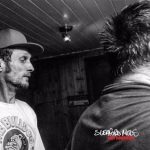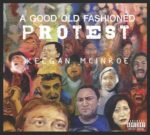 Keegan McInroe’s last album, “Uncouth Pilgrims”, was very much a troubadour’s set of songs; tales of his travels and celebrations of life. This one’s a very different beast. You can probably guess from the title that it’s full of protest songs, like the ones that Dylan, Joan Baez and Buffy Sainte-Marie used to sing in the sixties and seventies. Since the US election last year, after the initial disbelief, the references to the administration onstage from touring American bands started to become a regular thing. The odd critical song started to appear on albums, but Keegan McInroe has gone all the way. “A Good Old Fashioned Protest” is nine protest songs (well, eight songs and a poem) with media manipulation, environmental exploitation, militarism and hypocrisy firmly in its laser beam.
Keegan McInroe’s last album, “Uncouth Pilgrims”, was very much a troubadour’s set of songs; tales of his travels and celebrations of life. This one’s a very different beast. You can probably guess from the title that it’s full of protest songs, like the ones that Dylan, Joan Baez and Buffy Sainte-Marie used to sing in the sixties and seventies. Since the US election last year, after the initial disbelief, the references to the administration onstage from touring American bands started to become a regular thing. The odd critical song started to appear on albums, but Keegan McInroe has gone all the way. “A Good Old Fashioned Protest” is nine protest songs (well, eight songs and a poem) with media manipulation, environmental exploitation, militarism and hypocrisy firmly in its laser beam.
The album opens with “Talking Talking Head Blues”, a strummed acoustic backing underpinning a headlong rush through the evils afflicted on us by the current US administration (and let’s not think we can be too smug in the UK), including biased news, the surveillance society, dumbing down and smoke and mirrors. The narrative opens with Keegan waking from a dream to hear a talking head on a news show; the dream is from the last song on the album, “Keegan’s Beautiful Dream”, which has all of the anti-establishment protesters banding together to render the system impotent. The album comes full circle and the cycle starts all over again.
I’ve had a beer with Keegan; he’s a lovely guy. He’s witty, he’s well-read, he knows his music and he’s really laid-back, but here the message is anger bordering on rage at the state of the world today. He targets environmental exploitation in “Big River”, militarism in “Bombing for Peace”, hypocrisy and self-righteousness in “Bastards and Bitches” (there’s no token single swear word here to get a parental guidance sticker here, this album is full-on) and the causes of radicalisation in “Timmy Johnson’s Living Brother”. The poem “Nietzche Wore Boots” deserves a special mention; it satirises the way the plutocracy divides and rules and points the way to an apocalyptic ending that will be just another tiny event in the history of the planet. And it’s the pivot before the two songs of redemption that end the album. And they’re still protest songs, just protest songs with a positive message.
Tyrants hate the arts and people involved in the arts. They know that artists and writers and poets are free thinkers who never just accept what they’re told by the establishment. They ask awkward questions and they create works that criticise the status quo because someone has to. Keegan McInroe has done that with this album; he’s pulled together a varied bunch of songs that will pull you in with their rhythms and melodies and make you stop and think about what’s really going on in the world; maybe ask a few questions yourself. That has to be a good thing.
“A Good Old Fashioned Protest” is released on Friday January 12.
Maybe you already know that Allan’s a bit of a Southside Johnny fan. Ok, a lot of a Southside Johnny fan. So, we decided to invite Johnny to contribute to the 2017 High Fives. And he did, with not one but four sets of High Fives chosen by our random category generator. That’s the kind of value you get at a Jukes gig. Take it away, Southside…

Steven Van Zandt
5 songwriting heroes
Cole Porter
Tom Waits
Steven Van Zandt
Bob Dylan
Smokey Robinson
5 places he’d play every night

Paradiso Amsterdam
Paradiso, Amsterdam
Shepherd’s Bush, London
Birchmere, Alexandria, Virginia
Stone Pony Summer Stage, Asbury Park, NJ
Anywhere in Cleveland, Ohio
5 people he’d like to meet
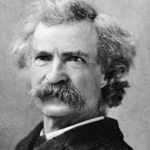
Mark Twain
Mark Twain
Big Bill Shakespeare
Barack Obama
Willie Dixon
My mother’s father
5 favourite harmonica solos
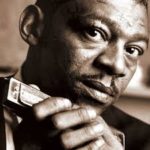
Little Walter
Big Walter, “Walking By Myself”,
Sonny Boy Williamson “Don’t Start Me Talking”,
Little Walter, “Tell me Mama” and “Lights Out”,
Paul Butterfield, “Born in Chicago” and a thousand others.
5 covers he hasn’t done yet
Way too many to list. Happy New Year!
 I don’t know why the idea of Scandinavian Americana should have seemed so strange at first; significant numbers of Scandinavians emigrated to the USA in the nineteenth century and it’s reasonable to assume that they brought their own flavours to America’s rich musical stew and that there would still be a cultural connection. Turns out that Americana is big in that part of northern Europe, both in homegrown and imported flavours, and that’s where Buford Pope (real name Mikael Liljeborg) comes in. Although he references Dylan as a touchstone, it’s difficult not to draw comparisons with Neil Young (particularly the Stray Gators phase) because of the high, keening voice and the plaintive pedal steel licks that permeate the album.
I don’t know why the idea of Scandinavian Americana should have seemed so strange at first; significant numbers of Scandinavians emigrated to the USA in the nineteenth century and it’s reasonable to assume that they brought their own flavours to America’s rich musical stew and that there would still be a cultural connection. Turns out that Americana is big in that part of northern Europe, both in homegrown and imported flavours, and that’s where Buford Pope (real name Mikael Liljeborg) comes in. Although he references Dylan as a touchstone, it’s difficult not to draw comparisons with Neil Young (particularly the Stray Gators phase) because of the high, keening voice and the plaintive pedal steel licks that permeate the album.
For his seventh album Buford Pope has opted for the naturalistic approach; learn the songs, get the right technical set-up and go in and play them once. And it works, although the album’s opening song “Still Got Dreams” is a bit too lo-fi for my taste. The lyrics deal with familiar roots themes: guns, drinking, driving (sometimes both at the same time) and families all feature in the mix. The recording process gives the album an intimacy and immediacy that recording tracks separately can never quite capture and highlights the interplay between the instruments, particularly the combination of slide or pedal steel and piano on “Infirmary” and “No Man’s Land”.
Standout songs? Well, the big chorus of “Freewheeling” and the epic Al Stewart feel of “The Baltic Sea” certainly do it for me.
“Blue-Eyed Boy” is released on Friday September 22 on Unchained Records (BP2017).
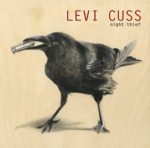 Levi Cuss has quite a back story. He’s lived an eventful life, done things that he regrets and done some time as a consequence, but ultimately it’s all grist to the mill. He’s living a more conventional life now (if writing and performing songs can be called conventional), using some of the experiences from earlier days as material for his songs and using music as a means of redemption. And that’s all very well, but is the music any good? Well, it is, as it happens; the songs are strong and the musical settings are always interesting. Producer Steve Dawson has brought in some vintage (seventies mainly) instruments and soundscapes to bring a sense of historical perspective to the narratives.
Levi Cuss has quite a back story. He’s lived an eventful life, done things that he regrets and done some time as a consequence, but ultimately it’s all grist to the mill. He’s living a more conventional life now (if writing and performing songs can be called conventional), using some of the experiences from earlier days as material for his songs and using music as a means of redemption. And that’s all very well, but is the music any good? Well, it is, as it happens; the songs are strong and the musical settings are always interesting. Producer Steve Dawson has brought in some vintage (seventies mainly) instruments and soundscapes to bring a sense of historical perspective to the narratives.
The songs are across a range of styles, but the musical settings are firmly rooted in the early seventies; the lively JJ Cale cover “Bring it Back”, a story about bringing contraband across the Mexican border which probably won’t be released as a single in the current climate, is part “Spirit in the Sky” and part Canned Heat’s “Let’s Work Together”. It’s raucous and great fun.
Without sounding derivative, the album is infused with seventies references. The opening song “Red City River” hints at Dylan and The Band, “Cut my Teeth” is country-rock and “Pills” is pedal steel-laced country about the twisted logic of assuming that pills are better than alcohol because ‘Pretty few songwriting people they take pills’. There are a few songwriting twists, “Saturday Night” is a laid-back, rather than lively take on the party night and “Grandma” is a tribute that celebrates a real life without sanitising it.
And that leaves a couple very interesting songs indeed. “Tecumseh” is a love song with a twist; where a man builds a relationship with the sister he murdered, and the closing song “Utumbo” which recreates a spacey retro synth mix of Pink Floyd and The Animals. It’s quite a way to close out an album that moves easily between retro styles with songs that have a strong autobiographical feel.
“Night Thief” is released on Friday March 10 and Levi Cuss will be touring the UK later in the year.
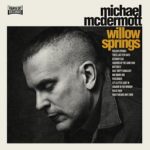 It’s only a few weeks since I was raving about the latest album from Michael McDermott’s band The Westies and he’s now releasing an album under his own name using most of the same musicians that played on The Westies album. Let me just cut straight to the chase here and say that “Willow Springs” is every bit as good as “Six on the Out”. It’s packed with powerful songs and creative but unfussy playing from Heather Horton, Will Kimbrough and John Deaderick; it’s every bit as powerful as “Six on the Out”, but “Willow Springs” is a very different musical approach to similar themes.
It’s only a few weeks since I was raving about the latest album from Michael McDermott’s band The Westies and he’s now releasing an album under his own name using most of the same musicians that played on The Westies album. Let me just cut straight to the chase here and say that “Willow Springs” is every bit as good as “Six on the Out”. It’s packed with powerful songs and creative but unfussy playing from Heather Horton, Will Kimbrough and John Deaderick; it’s every bit as powerful as “Six on the Out”, but “Willow Springs” is a very different musical approach to similar themes.
The album has a more intimate feel than the companion piece by The Westies; the album credits don’t list a drummer and although “Let A Little Light In” has all the punch of a mid-eighties Springsteen anthem, it’s not typical of the album. There’s a lot of acoustic guitar, banjo, fiddle and harmonica, but also some subversive touches like adding synth pads to fill out the sound. There’s a desire not to be stereotyped and packaged, which is explicit in “Folksinger” particularly.
“Willow Springs” is, more than anything else, a deeply personal album, springing from a turbulent period around the death of Michael McDermott’s father. There are references to his heritage on “Six on the Out”, but here it’s right out in the open. “Shadow in the Window” is a painful look at the death of a parent and the soul-searching that follows in its wake. The song ends with the keening repetition of ‘I Love you’ gradually fading and slowing before “Willie Rain” opens with the spoken ‘I love you Daddy’ leading in to a relentlessly upbeat stringband arrangement of a song about his daughter. Placing the two songs together demonstrates the circle of life and the ultimately uplifting feel of the album. There are sombre tales, plumbing the depths of addiction (“Butterfly”) and small-time larceny (“Getaway Car”), but the final two songs of the album both look to the future with optimism.
It’s almost inevitable that Michael McDermott will be compared with Dylan, Springsteen and others; maybe that’s flattering but it’s not the whole picture. When he writes, sometimes in a very matter-of-fact way about gangsters, prison and drugs, you know it’s coming from first-hand experience. “Willow Springs” is the sound of that experience being processed and used up before moving on to the next stage; it never sounds less than authentic. Maybe the time has come for the next American songwriter.
“Willow Springs” is released on Friday July 22nd 2016 on Pauper Sky Records. Michael McDermott will be touring the UK later this year.
And if you won’t take my word for it, have a look at the video for the title track:
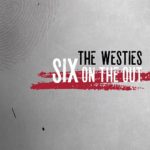 It might be a bit premature to say this in May, but “Six on the Out” is already a strong candidate for my album of the year. Michael McDermott’s dark urban poetry of the dispossessed, the dying and the damned is big and ambitious piece of work. The characters that inhabit the songs live in a twilight zone where ‘The flawed and the favoured, the outlaws, the saviours, all work both sides of the line’ and there’s always a risk of paying with your liberty or your life. There are elements of autobiography, but they’re used as jumping-off points to create alternative pasts and futures where single decisions change the course of many lives. It’s harrowing and the pathos is almost unbearable at times; it’s the work of someone who’s been there and lived to tell the tale.
It might be a bit premature to say this in May, but “Six on the Out” is already a strong candidate for my album of the year. Michael McDermott’s dark urban poetry of the dispossessed, the dying and the damned is big and ambitious piece of work. The characters that inhabit the songs live in a twilight zone where ‘The flawed and the favoured, the outlaws, the saviours, all work both sides of the line’ and there’s always a risk of paying with your liberty or your life. There are elements of autobiography, but they’re used as jumping-off points to create alternative pasts and futures where single decisions change the course of many lives. It’s harrowing and the pathos is almost unbearable at times; it’s the work of someone who’s been there and lived to tell the tale.
If you want to know where he’s been, have a look at the bio page on his website and you’ll start to get some idea. The core of The Westies is Michael McDermott and his wife Heather Horton, who plays fiddle and takes the lead vocal on the beautiful, sixties-sounding, “Like You Used To” which is immediately answered by McDermott’s exhilarating, Dylan-channelling “Everything is All I Want for You”. Along with the folky ballad “Henry McCarty”, McDermott’s take on the Billy the Kid story, the three songs in the middle of the album are an interlude offering a contrast with the despair of opening and closing songs.
The album opens with “If I Had a Gun”; subtly menacing acoustic and slide guitars create a brooding atmosphere for the first of several takes on the prisoner returning to society (“Parolee”, “Once Upon a Time”, “This I Know” and “Sirens” all explore different aspects of the same theme). It sets the tone for the album; you can deal with it, but you have to make the right choices. It’s only on the album’s bleak closer “Sirens” that McDermott allows the despair to triumph, but it’s only one of the possible outcomes of life in the margins; you can choose but the consequences are with you forever.
The musical stylings range from the full-band sound of “Pauper’s Sky” and “Santa Fe”, with drums and pounding bass evoking eighties American rock, to the lilting Celtic folk of the waltz-time “The Gang’s All Here” and the dovetail perfectly with the lyrical themes. Michael McDermott’s influences illuminate the album but he’s taken those and his own experiences to create a powerful piece of work that tells of desperate times and people without either condemning or praising. It’s not comfortable, and you’ll feel wrung out by the time “Sirens” ends but you’ll want to hear it again.
“Six on the Out” is released on June 3rd 2016 on Pauper Sky Records.
Michael McDermott will touring in the UK later in the year.
 Amelia White is from East Nashville. As Sam Lewis explained recently at Green Note, the distinction between downtown Nashville and East Nashville is one that means less and less the further you get away from Nashville, but it’s an important one. Downtown is the centre of the country establishment and East Nashville’s the edgy, hip satellite where you’re likely to hear something a bit out of the ordinary and “Home Sweet Hotel” certainly isn’t what you would call mainstream country. There’s a bit of a harder rock edge to most of the songs with a bit of overdriven guitar and some nice double lead guitar arrangements to spice the mix up.
Amelia White is from East Nashville. As Sam Lewis explained recently at Green Note, the distinction between downtown Nashville and East Nashville is one that means less and less the further you get away from Nashville, but it’s an important one. Downtown is the centre of the country establishment and East Nashville’s the edgy, hip satellite where you’re likely to hear something a bit out of the ordinary and “Home Sweet Hotel” certainly isn’t what you would call mainstream country. There’s a bit of a harder rock edge to most of the songs with a bit of overdriven guitar and some nice double lead guitar arrangements to spice the mix up.
The opening song “Dangerous Angel” is the first clue that this is a long way from mainstream country; there’s a slight emphasis on the offbeat which isn’t quite reggae, but it’s certainly leaning in that direction. From here on the album moves through a variety of musical stylings, including the uptempo country rock of “Leaving in my Blood” through the early Dylan feel of “Dogs Bark” to the slow sixties feel of “Right Back to my Arms” and “Six Feet Down” which close the album.
The lyrical theme running through the album is the performer moving along from town to town and it’s one that’s fairly common in current Americana. There’s no romance to being on the road, it’s just a succession of cheap motels and long drives and Amelia highlights this, and the longing to be back among family and friends (and with a lover). Her lyrical style is succinct; songs that seem to be densely packed with lyrics when you hear them turn out to be just a few lines long when you see them on the page. “Dogs Bark”, a warning against shooting your mouth off is a great example; it rattles along like some early multi-versed Dylan epic, but it’s really just a few very well-written lines (and some advice that Elvis Costello should have taken a long time ago).
Amelia sees herself as a songwriter first and performer second, and the craft in the construction of the songs is evident; there isn’t a word wasted and the lyrics are matched by the musical settings. And the East Nashville thing isn’t just about living there; Amelia creates a sense of place with references in “Rainbow over the Eastside” and the line ‘Hanging at The Family Wash’ from “Melissa”. It’s not just a place, it’s a way of life.
“Home Sweet Hotel” is out now on White-Wolf Records.
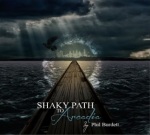 Every time I hear some delusional, no-talent wannabe on a TV talent show (not often, I admit) it should make me despair for music in the twenty-first century. The reason it doesn’t is that I know about people like Phil Burdett, a genuine visionary who’s about as far as it’s possible to get from the epicentre of what masquerades as the music business today. When I interviewed Phil about eighteen months ago in downtown Leigh-on-Sea, he told me that he was working an album to follow “Dunfearing and the West Country High” as the second part of the “Secular Mystic Trilogy”. Not only that but he was also working on another trilogy that would begin with “Humble Ardour Refrains”. So, on a budget of threepence-halfpenny and some lollipop sticks, he’s recorded two albums for Drumfire Records with some fabulous musicians from the Southend and Canvey area (more about the musicians later) and he’s releasing both of them at the same time.
Every time I hear some delusional, no-talent wannabe on a TV talent show (not often, I admit) it should make me despair for music in the twenty-first century. The reason it doesn’t is that I know about people like Phil Burdett, a genuine visionary who’s about as far as it’s possible to get from the epicentre of what masquerades as the music business today. When I interviewed Phil about eighteen months ago in downtown Leigh-on-Sea, he told me that he was working an album to follow “Dunfearing and the West Country High” as the second part of the “Secular Mystic Trilogy”. Not only that but he was also working on another trilogy that would begin with “Humble Ardour Refrains”. So, on a budget of threepence-halfpenny and some lollipop sticks, he’s recorded two albums for Drumfire Records with some fabulous musicians from the Southend and Canvey area (more about the musicians later) and he’s releasing both of them at the same time.
“Shaky Path to Arcadia” carries on where its predecessor left off, looking west towards the USA from Cornwall, but it’s a metaphorical and musical destination and it’s not the only direction the album goes in, geographically or temporally, before returning to Cornwall to complete the cycle. Without slipping in to ‘sixth-form-literary-criticism’ mode, I’m going to say that there’s a lot going on lyrically and the deeper you dig, the more precious stones you’ll unearth. The lyrics are strewn with references to American music and culture; there’s no mistaking the reference point for “Christmas in Casablanca”, but elsewhere there are references to Joe Hill, Billie Holiday, Dylan, Little Richard and many, many more. There are Dadaist references, travel references (trains, boats and buses and almost a plane) and if you look really closely, a lot of references to Basildon. There’s a lot of autobiography in there, but you need to know where and how to look.
Even without the lyrical content, you could listen to the album and be enthralled by Phil’s rich, powerful vocals and the performances of the band over a wide range of styles. From the mainly acoustic opening song, “Returning to Earth” to the counterpoint vocals in the coda of the album’s closer “I Dreamed I Saw Carl Wilson Last Night”, the band sounds superb. It’s ensemble playing at its finest; particularly on “Hellbound & Innocent” where a melodic bass line from Russ Strothard, an insanely catchy clipped John Bennett guitar hook and Jack Corder’s drums recreate the clickety-clack of the train on the track to perfection. Dee Hunter’s piano is the perfect foil for Phil’s voice on the haunting “Christmas in Casablanca” while Steve Stott’s fiddle on “Come Out Without a Hat (It’s Bound to Rain)” and “New Greyhound Rag” give an authentic country/bluegrass feel to the songs. And let’s not forget Colleen McCarthy’s lovely backing vocals and producer Mark Elliott’s esoteric samples.
“Shaky Path to Arcadia” is an example of how good an album can be when it’s put together by people who love what they do and they do it very, very well. Put the players together with another superb set of songs from the polymath poet of Westcliff-on-Sea and you’ve got a very fine album indeed. Any proper record collection should have some Phil Burdett in it and this is as good a place as any to start. “Humble Ardour Refrains” coming soon.
“Shaky Path to Arcadia” and “Humble Ardour Refrains” are both available to pre-order now from Drumfire Records.
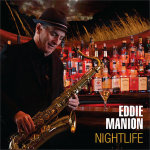 OK, so just to save a bit of time, we all know about Eddie Manion, yeah? Whaddya mean, no? Where have you been for the last forty years? You really should get out more. If you want the whole nine yards, check out his Wikipedia entry, but, just for the moment, his first major gig was with Southside Johnny and the Asbury Jukes, and since then he’s played with Dion, Dave Edmunds, Diana Ross, The Allman Brothers, Willy De Ville, Keith Richards and Bob Dylan and many, many more. He was part of the E Street Band for Bruce Springsteen’s “Wrecking Ball” tour and, more recently, he’s been touring Europe with the Light of Day Foundation raising money for Parkinson’s Disease research. His motto is ‘Have Sax, Will Travel’.
OK, so just to save a bit of time, we all know about Eddie Manion, yeah? Whaddya mean, no? Where have you been for the last forty years? You really should get out more. If you want the whole nine yards, check out his Wikipedia entry, but, just for the moment, his first major gig was with Southside Johnny and the Asbury Jukes, and since then he’s played with Dion, Dave Edmunds, Diana Ross, The Allman Brothers, Willy De Ville, Keith Richards and Bob Dylan and many, many more. He was part of the E Street Band for Bruce Springsteen’s “Wrecking Ball” tour and, more recently, he’s been touring Europe with the Light of Day Foundation raising money for Parkinson’s Disease research. His motto is ‘Have Sax, Will Travel’.
Eddie Manion plays tenor and baritone sax (mainly baritone when working as part of a horn section) as well as having a pretty good voice, which you can hear on his first solo album, “Follow Through”, released in 2004. At the end of the gargantuan “Wrecking Ball” tour, Eddie started work on his second solo album “Nightlife”, opting this time for instrumental interpretations of standards and not-quite-so-standards, rather than his own compositions. It’s a double-edged sword. Both ways you’re going to be judged; one way you’re compared with others’ songwriting, the other way you’re compared with previous versions of the same songs. So how does “Nightlife” shape up?
I guess it’s natural for anyone who’s spent their entire adult life as a professional musician to want to do their own thing once in a while. Eddie Manion’s spent a lot of time playing in horn sections in big bands where nuance isn’t always too high on the agenda, so when the window of opportunity opened, he pulled together a superb bunch of musicians to make an album placing his sax playing firmly stage centre against a backdrop that allows him to interpret songs with style and subtlety. From the album’s opener, a gorgeous version of the theme from the 1961 movie “Town Without Pity”, with its piano triplets and wah-wah trumpet, to the closer “”The Only One, from Roy Orbison’s final album, the album demonstrates Eddie’s ability to create flawless interpretations of jazz standards such as “Smoke Gets in Your Eyes” and “Stardust” whilst also combining Springsteen’s “City of Night” in a medley with King Curtis’s “Soul Serenade”.
Throughout “Nightlife”, Eddie Manion combines a jazz-styled finesse with a rawer rock edge to create a satisfying and varied set of instrumentals that embody great musicianship and sympathetic arrangements. If you value musical skill and the ability to pick a good tune, then you’ll love this; Eddie’s a superb player and he’s surrounded himself with like minds to produce a real musician’s album. As an added bonus, Eddie’s also a very good photographer and the CD packaging includes some of his own fabulous photos taken mainly on the “Wrecking Ball” tour; it’s the icing on the cake of a lovely album.
You can order it here.
We’re officially giving a big thank you to Phil Burdett for this contribution. Phil should have been playing a launch gig for his two (yes, two) new Drumfire Records albums tonight, but he’s spent a few days in hospital this week and he’s at home now recovering. Despite that, he still managed to write about his five favourite things this year for us; we salute you Mr Burdett and we hope that your recovery is swift and complete.
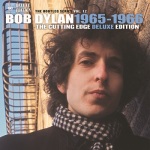 Bob Dylan – “The Cutting Edge”
Bob Dylan – “The Cutting Edge”
The fabulous set of out-takes from the Zimmerman back catalogue is a fascinating peek through the studio door as his muse churns & twists words & phrases to fit the evolving music. A must for any Bobcats still stuck in his anorak pocket.
A new breath of fresh air that I only got into after going on a local radio show during which they played me songs I’d probably hate to get me to slag them off. I did and got banned but this one I liked. Has a DIY, Rough Trade, shouty, 1978 kinda vibe & I’m into that kinda vibe, y’know?
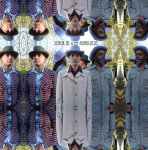 Senor Al & the Honolulus – “Bluestronic Soul”
Senor Al & the Honolulus – “Bluestronic Soul”
Somewhere at a party thrown by Roky Erikson through amps designed by Neil Young, the bastard child of Captain Beefheart & a tequila-wrecked lay preacher from San Jose testifies…strictly late 2014 but I missed it.
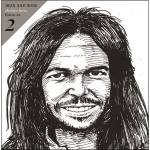 Iron and Wine – Archive Series Volume No. 2
Iron and Wine – Archive Series Volume No. 2
Grumbly little shards of country lo-fi that either intrigue or delight in equal measure, both of which are fine by me.
 X Factor getting less viewers than Antiques Roadshow
X Factor getting less viewers than Antiques Roadshow
Bunch of so called experts judging people who are only in it for how much money they’re gonna make…Mind you, that X Factor’s just as bad…



